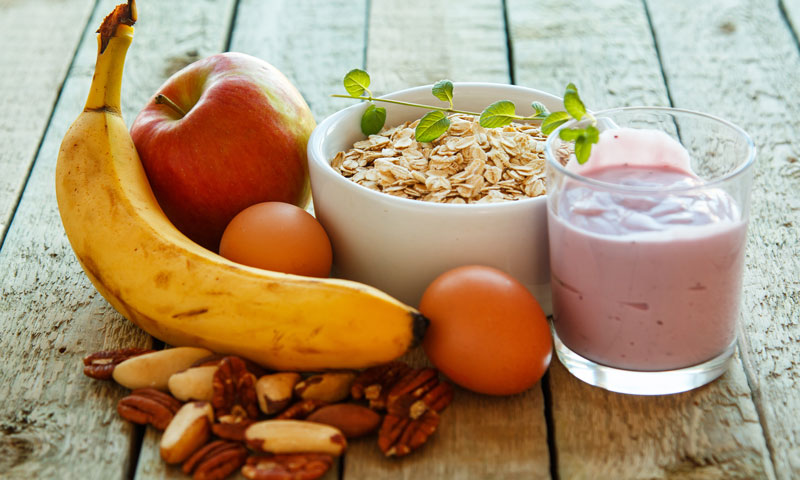Exercise Daily – After an intense workout, providing your body with the right nutrients is crucial for muscle repair, recovery, and performance improvement. Proper sport nutrition, particularly post-exercise muscle recovery strategies, can significantly reduce muscle soreness and repair skeletal muscle damage. Consuming protein after a workout stimulates muscle protein synthesis, aiding in muscle repair and restoring muscle glycogen stores. The International Society of Sports Nutrition highlights the importance of replenishing muscle glycogen to optimize recovery following strenuous exercise, which helps reduce markers of muscle damage and accelerates the recovery of muscle mass and strength.
Effective post-workout nutrition is key in reducing exercise-induced muscle damage and promoting skeletal muscle adaptation. By ensuring adequate protein and carbohydrate intake, you can aid in the recovery of muscle cells for repair and build muscle mass over time. Research from the Society of Sports Nutrition’s position emphasizes the significance of supplementation on muscle recovery and performance. Implementing these strategies will improve recovery and enhance your performance in your next workout by reducing muscle damage and improving muscle glycogen synthesis within the crucial two-hour post-exercise window.
The Importance of Post-Workout Nutrition
The period immediately following a workout is often called the “anabolic window,” a crucial time for muscle recovery. During this time, your muscles are especially receptive to nutrients that aid repair and rebuilding. This makes post-workout nutrition a key element for refueling your body and enhancing muscle recovery, replenishing energy stores, and promoting long-term muscle growth.
Timing of Post-Workout Nutrition: The Anabolic Window
It’s widely accepted that the first 30 minutes to two hours post-workout is the most beneficial time to consume nutrients. This window allows your body to take full advantage of the increased insulin sensitivity and nutrient uptake, ensuring that the fuel you provide goes straight into muscle recovery. Missing this window may lead to slower recovery and less efficient muscle repair.
The Role of Hormones in Recovery
After a workout, hormones like insulin and growth hormone facilitate nutrient absorption and muscle repair. Insulin helps transport glucose into the muscles, replenishing glycogen stores, while growth hormone stimulates protein synthesis. Consuming the right nutrients at the right time helps these hormones do their job more efficiently.

Understanding Muscle Recovery
Muscle recovery is a complex biological process essential for muscle growth and adaptation. When you engage in resistance or endurance exercise, microscopic damage occurs to your muscle fibers. The recovery phase is when the body repairs these fibers, making them stronger and more resilient for future physical challenges.
Muscle Repair and Recovery Processes
When you lift weights or push through a challenging workout, your muscles endure tiny tears necessary for muscle growth. During recovery, your body starts to repair these tears using protein and other nutrients, strengthening the muscle. This cycle of damage and repair leads to muscle hypertrophy (growth) over time.
The Impact of Intensity on Recovery Needs
The intensity of your workout directly influences your recovery needs. Higher-intensity workouts, such as heavy lifting or high-intensity interval training (HIIT), create more muscle damage, requiring more time and nutrients for recovery. In contrast, lower-intensity workouts may not demand the same level of post-workout nutrition but still benefit from a balanced meal to support overall recovery.
Post-Workout Nutrition for Maximum Muscle Recovery
Carbohydrates and Their Role in Recovery
Carbohydrates are a vital part of your post-workout nutrition strategy. During exercise, your body depletes glycogen stores; carbohydrates stored in the muscles and liver for energy. After a workout, replenishing these glycogen stores is essential for muscle recovery and maintaining energy levels in subsequent workouts.
Replenishing Muscle Glycogen
Whole grains, fruits, and starchy vegetables like sweet potatoes are excellent choices to restore glycogen levels after exercise. These sources provide the necessary carbohydrates and deliver fiber, vitamins, and minerals that support overall health and recovery.
Fast-Digesting Carbohydrates
While whole foods are generally best for long-term health, there may be benefits to consuming fast-digesting carbohydrates, like fruit or even a sports drink, immediately after an intense workout. These quick sources of glucose can speed up glycogen replenishment, particularly when paired with protein.
The Importance of Protein for Muscle Repair
Protein is perhaps the most talked-about macronutrient in post-workout nutrition. It plays a key role in muscle repair and growth by providing the body with amino acids, the building blocks of muscle tissue.
Amino Acids and Muscle Synthesis
Amino acids are crucial to muscle protein synthesis (MPS), the mechanism by which muscles repair and grow after exercise. Branched-chain amino acids (BCAAs) like leucine are particularly important for triggering MPS. High-quality protein sources like chicken, eggs, fish, and plant-based proteins such as tofu or tempeh are excellent post-workout meals.
Whey Protein vs. Plant-Based Protein
For those who prefer convenience, whey protein is an easily digestible option rich in all essential amino acids. Plant-based protein powders can also be effective but may need to be paired with complementary proteins to ensure a complete amino acid profile.

Healthy Fats for Reducing Inflammation
Healthy fats, particularly omega-3 fatty acids, are critical in reducing post-workout inflammation. Omega-3s, found in foods like salmon, chia seeds, and flaxseeds, help counteract muscle damage and inflammation during exercise, speeding up recovery.
The Benefits of Omega-3s for Muscle Recovery
Research suggests that omega-3 fatty acids may reduce inflammation and enhance muscle protein synthesis, making them a valuable component of post-workout nutrition. Including foods rich in these fats can lead to less muscle soreness and a quicker return to training.
Optimizing Your Post-Workout Meal
Ideal Timing for Post-Workout Nutrition
While the anabolic window is often discussed, it’s important to note that the overall quality of your meals throughout the day is equally crucial. However, eating within 30 minutes to two hours post-workout remains a good guideline to ensure you’re providing your muscles with the nutrients they need when they need them most.
Recommended Post-Workout Foods
The best post-workout meals combine protein, carbohydrates, and a small amount of fat to provide balanced nutrition. Here are a few ideal combinations:
- Grilled chicken with quinoa and roasted vegetables: A great source of lean protein, complex carbohydrates, and fiber.
- Greek yogurt with mixed berries and honey provides fast-digesting carbs and high-quality protein.
- Smoothie with banana, spinach, and protein powder: A quick, convenient option packed with nutrients.
- Tuna salad with avocado and whole grain crackers: Offers omega-3s, protein, and healthy carbs.
Hydration and Electrolyte Balance
Post-workout recovery is about more than just food; hydration plays a key role. When you sweat, your body loses fluids and electrolytes, which need to be replaced to maintain fluid balance and prevent dehydration. Drinking water is important, but adding a pinch of salt or a sports drink with electrolytes can help replenish sodium, potassium, and magnesium levels.
How to Maximize Muscle Growth with Nutrition
Key Nutritional Strategies for Long-Term Muscle Health
Long-term muscle growth requires more than just a post-workout snack. It demands a consistent commitment to providing your body with the nutrients it needs to grow. A diet rich in high-quality protein, complex carbohydrates, and healthy fats ensures that your muscles are fueled after workouts and throughout the day.
Nutrition During Recovery Phases
Recovery days are just as crucial as training days regarding muscle growth. Focus on nutrient-dense foods that reduce inflammation and support muscle repair, such as leafy greens, nuts, seeds, and fatty fish. Eating well on your rest days ensures your muscles have the tools to rebuild and grow.
Nutritional Supplements: Do You Need Them?
Supplements like protein powders, BCAAs, and creatine can benefit those struggling to meet their nutritional needs through whole foods. However, they should be seen as a supplement to—not a replacement for—a balanced diet. If you’re consistently eating nutrient-dense meals, supplements may not be necessary for optimal recovery.

Common Mistakes to Avoid in Post-Workout Nutrition
Even with the best intentions, there are common mistakes people make when it comes to post-workout nutrition:
- Skipping meals: Not eating after exercise can slow muscle recovery and impair performance in future workouts.
- Overeating: While it’s important to refuel, using your workout as an excuse to overindulge can lead to unwanted weight gain.
- Neglecting hydration: Rehydrating after exercise is critical for recovery. Ensure you’re drinking enough water or electrolyte-rich beverages.
FAQs – Nutrition Strategies for Faster Recovery Post-Workout
Q: What should I eat immediately after a workout?
A: A combination of carbohydrates and protein, such as a smoothie or a chicken and rice meal, is ideal for post-workout recovery.
Q: How long after a workout should I eat?
A: Aim to eat within 30 minutes to two hours after your workout for optimal recovery.
Q: Can I just drink a protein shake after working out?
A: Yes, a protein shake is a convenient option, but pairing it with some carbohydrates will help replenish glycogen stores faster.
Q: Do I need supplements for muscle recovery?
A: Supplements can be useful, but a balanced diet rich in whole foods is usually sufficient for recovery.
Q: What’s the best way to speed up muscle recovery?
A: Focus on balanced nutrition, proper hydration, rest, and stretching to support muscle repair and recovery.




